International Business Management Entry Mode and PESTLE Report
VerifiedAdded on 2020/02/03
|10
|2668
|65
Report
AI Summary
This report delves into the core concepts of international business management, providing a comprehensive overview of key strategies and analytical tools. The report begins by exploring various modes of entry into international markets, including international agents, licensing, strategic alliances, joint ventures, international sales subsidiaries, and direct/indirect exporting, as well as the use of the internet. It then proceeds to conduct a PESTLE analysis, examining the political, economic, social, technological, legal, and environmental factors that influence international business operations. Furthermore, the report addresses the ethical considerations inherent in international business, focusing on issues such as employment practices, human rights, environmental pollution, and corruption. The report concludes by emphasizing the importance of these factors in the effective management and sustainable development of international businesses, highlighting their impact on economic growth and technological advancements. This analysis is crucial for understanding the complexities of operating in a globalized marketplace.
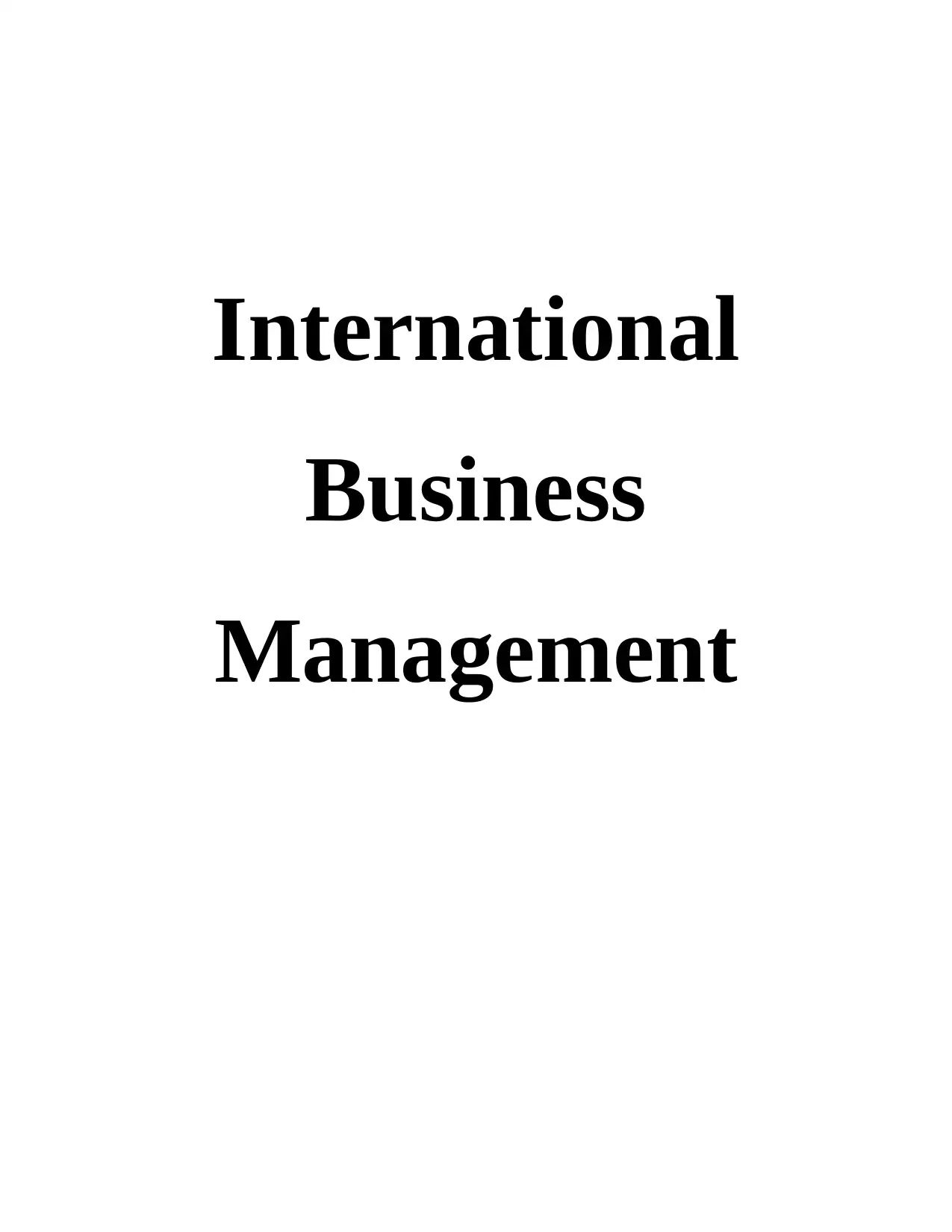
International
Business
Management
Business
Management
Paraphrase This Document
Need a fresh take? Get an instant paraphrase of this document with our AI Paraphraser
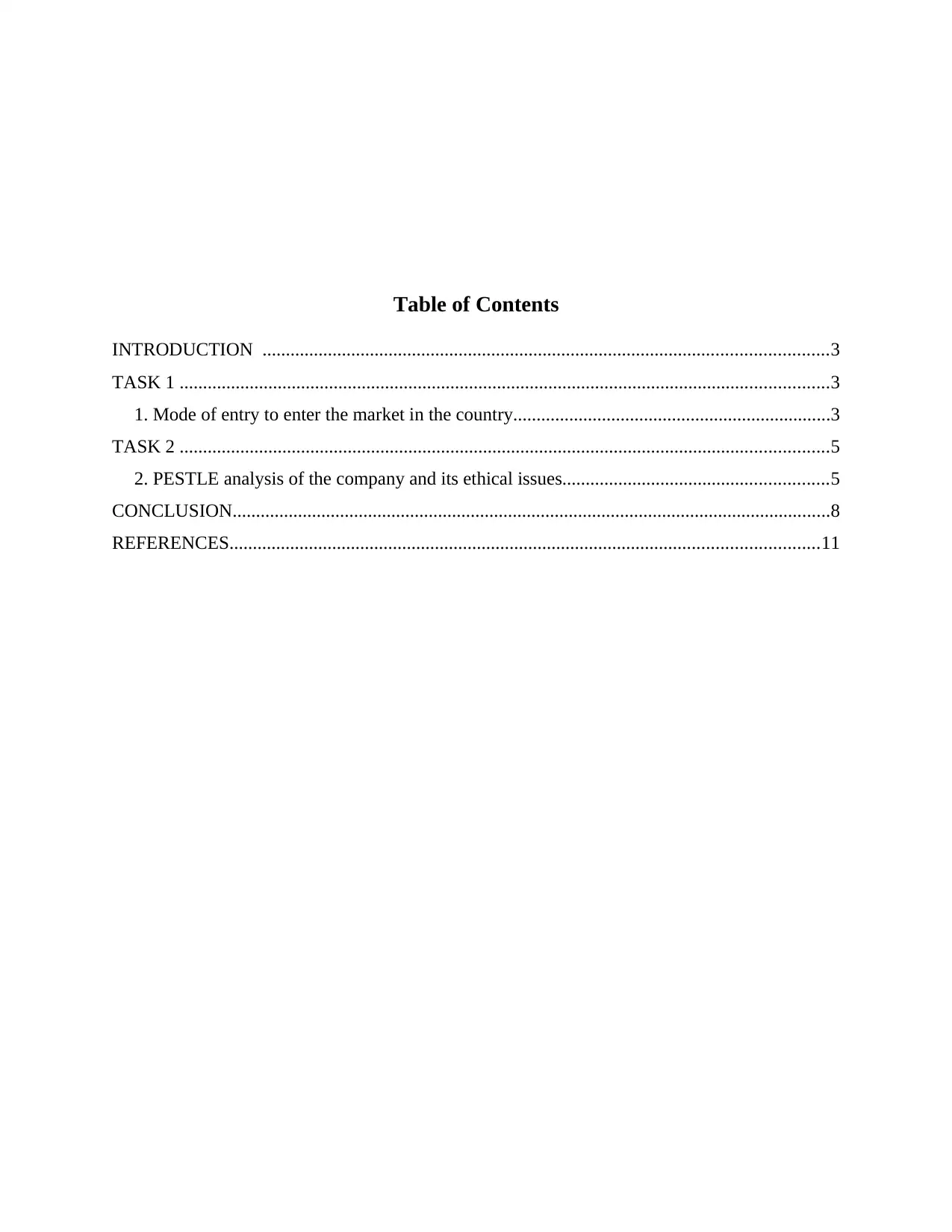
Table of Contents
INTRODUCTION .........................................................................................................................3
TASK 1 ...........................................................................................................................................3
1. Mode of entry to enter the market in the country....................................................................3
TASK 2 ...........................................................................................................................................5
2. PESTLE analysis of the company and its ethical issues.........................................................5
CONCLUSION................................................................................................................................8
REFERENCES..............................................................................................................................11
INTRODUCTION .........................................................................................................................3
TASK 1 ...........................................................................................................................................3
1. Mode of entry to enter the market in the country....................................................................3
TASK 2 ...........................................................................................................................................5
2. PESTLE analysis of the company and its ethical issues.........................................................5
CONCLUSION................................................................................................................................8
REFERENCES..............................................................................................................................11
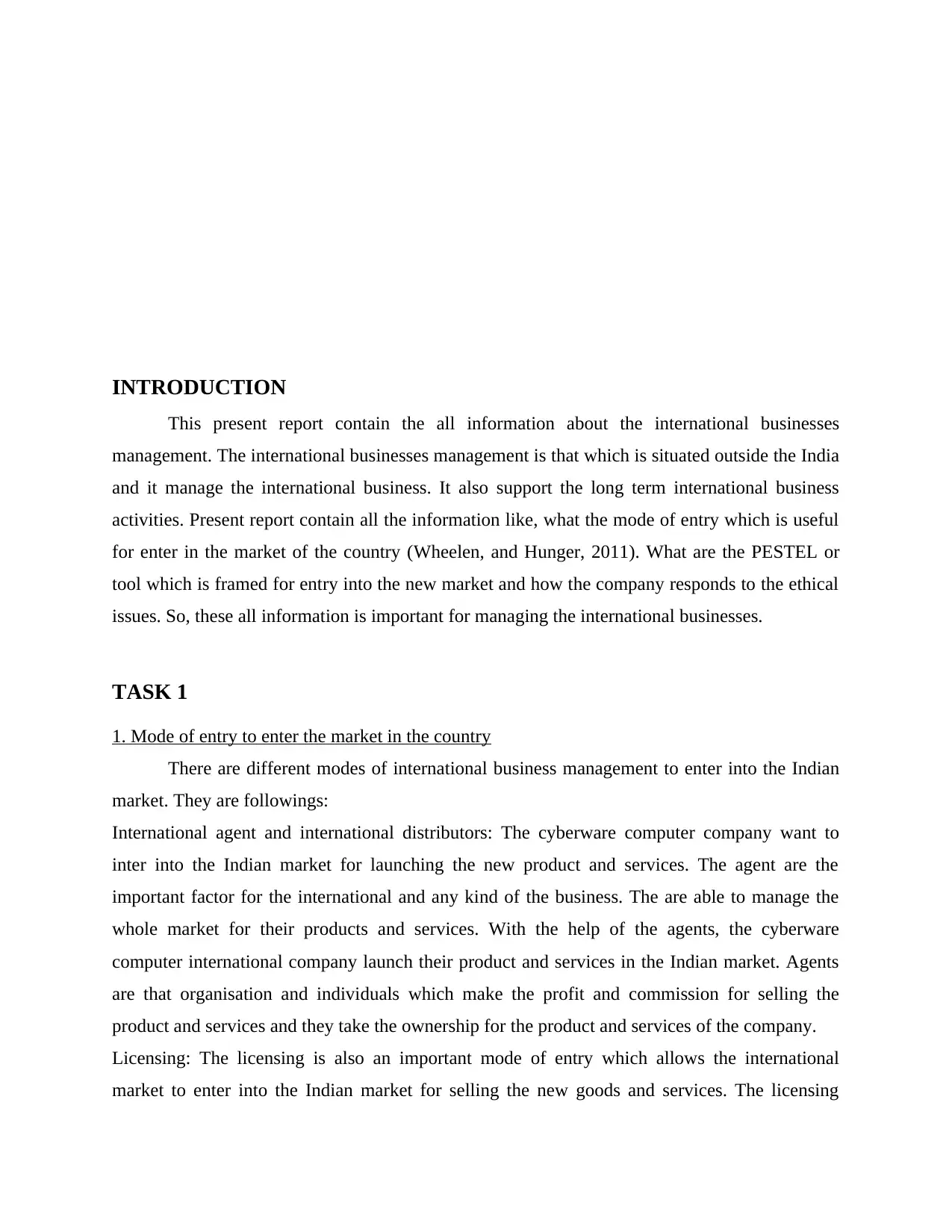
INTRODUCTION
This present report contain the all information about the international businesses
management. The international businesses management is that which is situated outside the India
and it manage the international business. It also support the long term international business
activities. Present report contain all the information like, what the mode of entry which is useful
for enter in the market of the country (Wheelen, and Hunger, 2011). What are the PESTEL or
tool which is framed for entry into the new market and how the company responds to the ethical
issues. So, these all information is important for managing the international businesses.
TASK 1
1. Mode of entry to enter the market in the country
There are different modes of international business management to enter into the Indian
market. They are followings:
International agent and international distributors: The cyberware computer company want to
inter into the Indian market for launching the new product and services. The agent are the
important factor for the international and any kind of the business. The are able to manage the
whole market for their products and services. With the help of the agents, the cyberware
computer international company launch their product and services in the Indian market. Agents
are that organisation and individuals which make the profit and commission for selling the
product and services and they take the ownership for the product and services of the company.
Licensing: The licensing is also an important mode of entry which allows the international
market to enter into the Indian market for selling the new goods and services. The licensing
This present report contain the all information about the international businesses
management. The international businesses management is that which is situated outside the India
and it manage the international business. It also support the long term international business
activities. Present report contain all the information like, what the mode of entry which is useful
for enter in the market of the country (Wheelen, and Hunger, 2011). What are the PESTEL or
tool which is framed for entry into the new market and how the company responds to the ethical
issues. So, these all information is important for managing the international businesses.
TASK 1
1. Mode of entry to enter the market in the country
There are different modes of international business management to enter into the Indian
market. They are followings:
International agent and international distributors: The cyberware computer company want to
inter into the Indian market for launching the new product and services. The agent are the
important factor for the international and any kind of the business. The are able to manage the
whole market for their products and services. With the help of the agents, the cyberware
computer international company launch their product and services in the Indian market. Agents
are that organisation and individuals which make the profit and commission for selling the
product and services and they take the ownership for the product and services of the company.
Licensing: The licensing is also an important mode of entry which allows the international
market to enter into the Indian market for selling the new goods and services. The licensing
⊘ This is a preview!⊘
Do you want full access?
Subscribe today to unlock all pages.

Trusted by 1+ million students worldwide
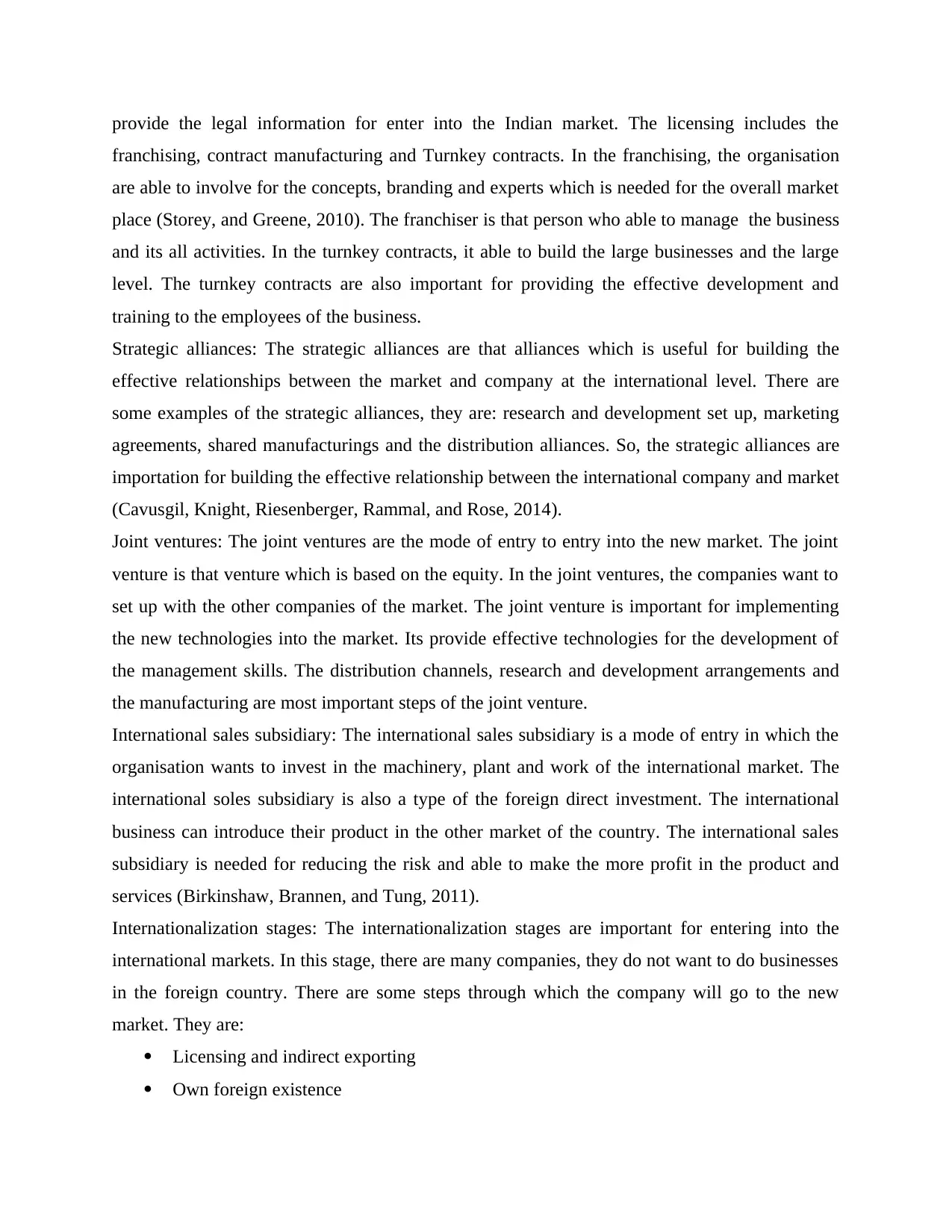
provide the legal information for enter into the Indian market. The licensing includes the
franchising, contract manufacturing and Turnkey contracts. In the franchising, the organisation
are able to involve for the concepts, branding and experts which is needed for the overall market
place (Storey, and Greene, 2010). The franchiser is that person who able to manage the business
and its all activities. In the turnkey contracts, it able to build the large businesses and the large
level. The turnkey contracts are also important for providing the effective development and
training to the employees of the business.
Strategic alliances: The strategic alliances are that alliances which is useful for building the
effective relationships between the market and company at the international level. There are
some examples of the strategic alliances, they are: research and development set up, marketing
agreements, shared manufacturings and the distribution alliances. So, the strategic alliances are
importation for building the effective relationship between the international company and market
(Cavusgil, Knight, Riesenberger, Rammal, and Rose, 2014).
Joint ventures: The joint ventures are the mode of entry to entry into the new market. The joint
venture is that venture which is based on the equity. In the joint ventures, the companies want to
set up with the other companies of the market. The joint venture is important for implementing
the new technologies into the market. Its provide effective technologies for the development of
the management skills. The distribution channels, research and development arrangements and
the manufacturing are most important steps of the joint venture.
International sales subsidiary: The international sales subsidiary is a mode of entry in which the
organisation wants to invest in the machinery, plant and work of the international market. The
international soles subsidiary is also a type of the foreign direct investment. The international
business can introduce their product in the other market of the country. The international sales
subsidiary is needed for reducing the risk and able to make the more profit in the product and
services (Birkinshaw, Brannen, and Tung, 2011).
Internationalization stages: The internationalization stages are important for entering into the
international markets. In this stage, there are many companies, they do not want to do businesses
in the foreign country. There are some steps through which the company will go to the new
market. They are:
Licensing and indirect exporting
Own foreign existence
franchising, contract manufacturing and Turnkey contracts. In the franchising, the organisation
are able to involve for the concepts, branding and experts which is needed for the overall market
place (Storey, and Greene, 2010). The franchiser is that person who able to manage the business
and its all activities. In the turnkey contracts, it able to build the large businesses and the large
level. The turnkey contracts are also important for providing the effective development and
training to the employees of the business.
Strategic alliances: The strategic alliances are that alliances which is useful for building the
effective relationships between the market and company at the international level. There are
some examples of the strategic alliances, they are: research and development set up, marketing
agreements, shared manufacturings and the distribution alliances. So, the strategic alliances are
importation for building the effective relationship between the international company and market
(Cavusgil, Knight, Riesenberger, Rammal, and Rose, 2014).
Joint ventures: The joint ventures are the mode of entry to entry into the new market. The joint
venture is that venture which is based on the equity. In the joint ventures, the companies want to
set up with the other companies of the market. The joint venture is important for implementing
the new technologies into the market. Its provide effective technologies for the development of
the management skills. The distribution channels, research and development arrangements and
the manufacturing are most important steps of the joint venture.
International sales subsidiary: The international sales subsidiary is a mode of entry in which the
organisation wants to invest in the machinery, plant and work of the international market. The
international soles subsidiary is also a type of the foreign direct investment. The international
business can introduce their product in the other market of the country. The international sales
subsidiary is needed for reducing the risk and able to make the more profit in the product and
services (Birkinshaw, Brannen, and Tung, 2011).
Internationalization stages: The internationalization stages are important for entering into the
international markets. In this stage, there are many companies, they do not want to do businesses
in the foreign country. There are some steps through which the company will go to the new
market. They are:
Licensing and indirect exporting
Own foreign existence
Paraphrase This Document
Need a fresh take? Get an instant paraphrase of this document with our AI Paraphraser
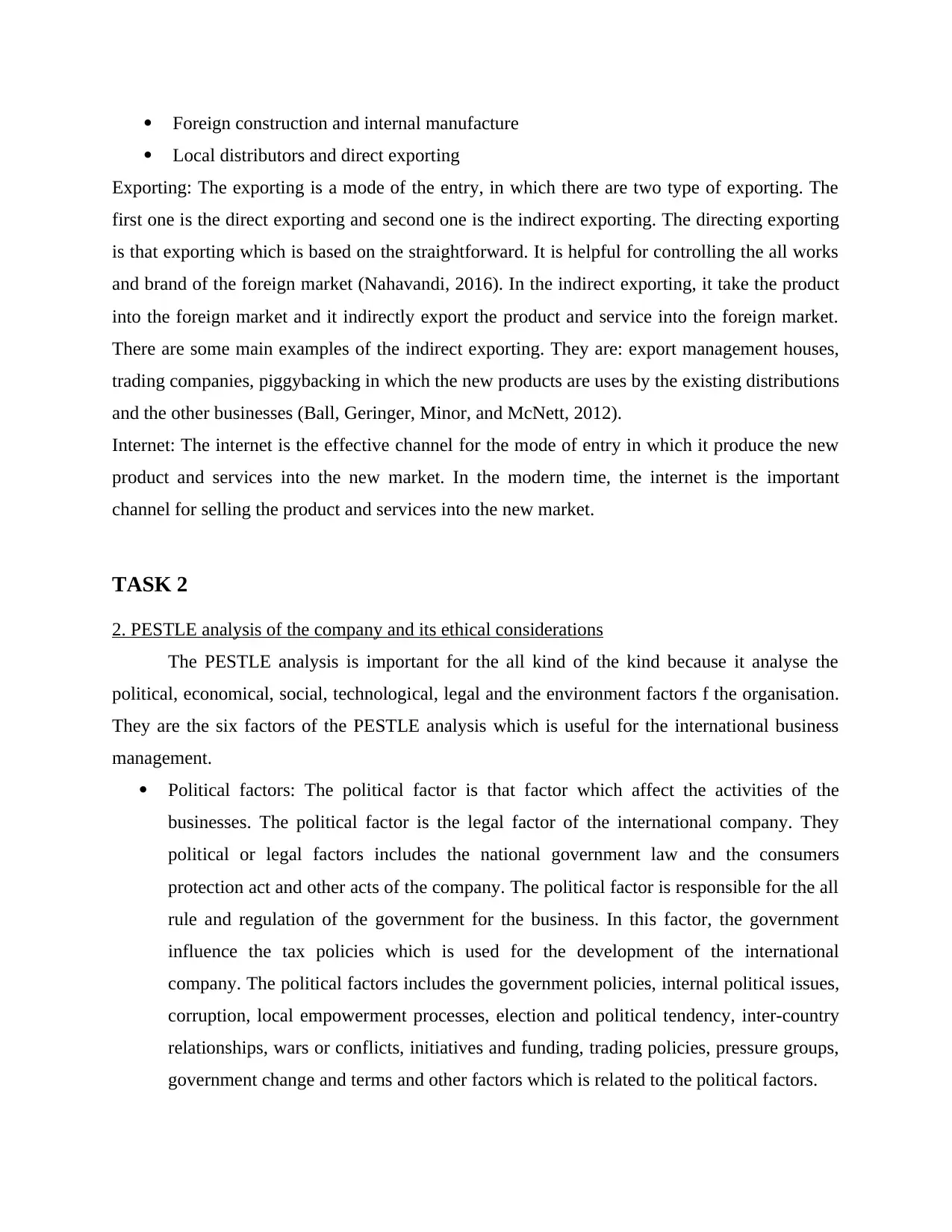
Foreign construction and internal manufacture
Local distributors and direct exporting
Exporting: The exporting is a mode of the entry, in which there are two type of exporting. The
first one is the direct exporting and second one is the indirect exporting. The directing exporting
is that exporting which is based on the straightforward. It is helpful for controlling the all works
and brand of the foreign market (Nahavandi, 2016). In the indirect exporting, it take the product
into the foreign market and it indirectly export the product and service into the foreign market.
There are some main examples of the indirect exporting. They are: export management houses,
trading companies, piggybacking in which the new products are uses by the existing distributions
and the other businesses (Ball, Geringer, Minor, and McNett, 2012).
Internet: The internet is the effective channel for the mode of entry in which it produce the new
product and services into the new market. In the modern time, the internet is the important
channel for selling the product and services into the new market.
TASK 2
2. PESTLE analysis of the company and its ethical considerations
The PESTLE analysis is important for the all kind of the kind because it analyse the
political, economical, social, technological, legal and the environment factors f the organisation.
They are the six factors of the PESTLE analysis which is useful for the international business
management.
Political factors: The political factor is that factor which affect the activities of the
businesses. The political factor is the legal factor of the international company. They
political or legal factors includes the national government law and the consumers
protection act and other acts of the company. The political factor is responsible for the all
rule and regulation of the government for the business. In this factor, the government
influence the tax policies which is used for the development of the international
company. The political factors includes the government policies, internal political issues,
corruption, local empowerment processes, election and political tendency, inter-country
relationships, wars or conflicts, initiatives and funding, trading policies, pressure groups,
government change and terms and other factors which is related to the political factors.
Local distributors and direct exporting
Exporting: The exporting is a mode of the entry, in which there are two type of exporting. The
first one is the direct exporting and second one is the indirect exporting. The directing exporting
is that exporting which is based on the straightforward. It is helpful for controlling the all works
and brand of the foreign market (Nahavandi, 2016). In the indirect exporting, it take the product
into the foreign market and it indirectly export the product and service into the foreign market.
There are some main examples of the indirect exporting. They are: export management houses,
trading companies, piggybacking in which the new products are uses by the existing distributions
and the other businesses (Ball, Geringer, Minor, and McNett, 2012).
Internet: The internet is the effective channel for the mode of entry in which it produce the new
product and services into the new market. In the modern time, the internet is the important
channel for selling the product and services into the new market.
TASK 2
2. PESTLE analysis of the company and its ethical considerations
The PESTLE analysis is important for the all kind of the kind because it analyse the
political, economical, social, technological, legal and the environment factors f the organisation.
They are the six factors of the PESTLE analysis which is useful for the international business
management.
Political factors: The political factor is that factor which affect the activities of the
businesses. The political factor is the legal factor of the international company. They
political or legal factors includes the national government law and the consumers
protection act and other acts of the company. The political factor is responsible for the all
rule and regulation of the government for the business. In this factor, the government
influence the tax policies which is used for the development of the international
company. The political factors includes the government policies, internal political issues,
corruption, local empowerment processes, election and political tendency, inter-country
relationships, wars or conflicts, initiatives and funding, trading policies, pressure groups,
government change and terms and other factors which is related to the political factors.
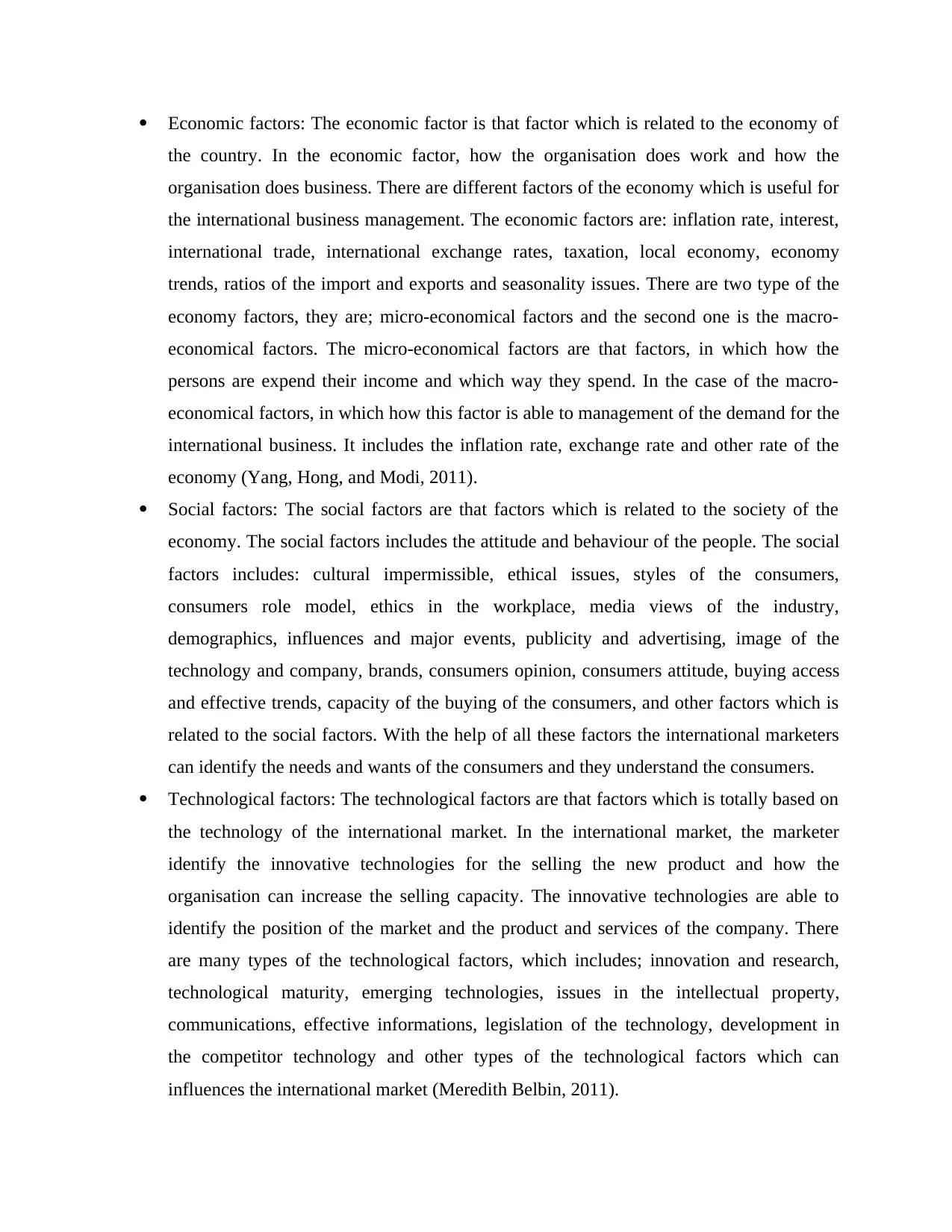
Economic factors: The economic factor is that factor which is related to the economy of
the country. In the economic factor, how the organisation does work and how the
organisation does business. There are different factors of the economy which is useful for
the international business management. The economic factors are: inflation rate, interest,
international trade, international exchange rates, taxation, local economy, economy
trends, ratios of the import and exports and seasonality issues. There are two type of the
economy factors, they are; micro-economical factors and the second one is the macro-
economical factors. The micro-economical factors are that factors, in which how the
persons are expend their income and which way they spend. In the case of the macro-
economical factors, in which how this factor is able to management of the demand for the
international business. It includes the inflation rate, exchange rate and other rate of the
economy (Yang, Hong, and Modi, 2011).
Social factors: The social factors are that factors which is related to the society of the
economy. The social factors includes the attitude and behaviour of the people. The social
factors includes: cultural impermissible, ethical issues, styles of the consumers,
consumers role model, ethics in the workplace, media views of the industry,
demographics, influences and major events, publicity and advertising, image of the
technology and company, brands, consumers opinion, consumers attitude, buying access
and effective trends, capacity of the buying of the consumers, and other factors which is
related to the social factors. With the help of all these factors the international marketers
can identify the needs and wants of the consumers and they understand the consumers.
Technological factors: The technological factors are that factors which is totally based on
the technology of the international market. In the international market, the marketer
identify the innovative technologies for the selling the new product and how the
organisation can increase the selling capacity. The innovative technologies are able to
identify the position of the market and the product and services of the company. There
are many types of the technological factors, which includes; innovation and research,
technological maturity, emerging technologies, issues in the intellectual property,
communications, effective informations, legislation of the technology, development in
the competitor technology and other types of the technological factors which can
influences the international market (Meredith Belbin, 2011).
the country. In the economic factor, how the organisation does work and how the
organisation does business. There are different factors of the economy which is useful for
the international business management. The economic factors are: inflation rate, interest,
international trade, international exchange rates, taxation, local economy, economy
trends, ratios of the import and exports and seasonality issues. There are two type of the
economy factors, they are; micro-economical factors and the second one is the macro-
economical factors. The micro-economical factors are that factors, in which how the
persons are expend their income and which way they spend. In the case of the macro-
economical factors, in which how this factor is able to management of the demand for the
international business. It includes the inflation rate, exchange rate and other rate of the
economy (Yang, Hong, and Modi, 2011).
Social factors: The social factors are that factors which is related to the society of the
economy. The social factors includes the attitude and behaviour of the people. The social
factors includes: cultural impermissible, ethical issues, styles of the consumers,
consumers role model, ethics in the workplace, media views of the industry,
demographics, influences and major events, publicity and advertising, image of the
technology and company, brands, consumers opinion, consumers attitude, buying access
and effective trends, capacity of the buying of the consumers, and other factors which is
related to the social factors. With the help of all these factors the international marketers
can identify the needs and wants of the consumers and they understand the consumers.
Technological factors: The technological factors are that factors which is totally based on
the technology of the international market. In the international market, the marketer
identify the innovative technologies for the selling the new product and how the
organisation can increase the selling capacity. The innovative technologies are able to
identify the position of the market and the product and services of the company. There
are many types of the technological factors, which includes; innovation and research,
technological maturity, emerging technologies, issues in the intellectual property,
communications, effective informations, legislation of the technology, development in
the competitor technology and other types of the technological factors which can
influences the international market (Meredith Belbin, 2011).
⊘ This is a preview!⊘
Do you want full access?
Subscribe today to unlock all pages.

Trusted by 1+ million students worldwide
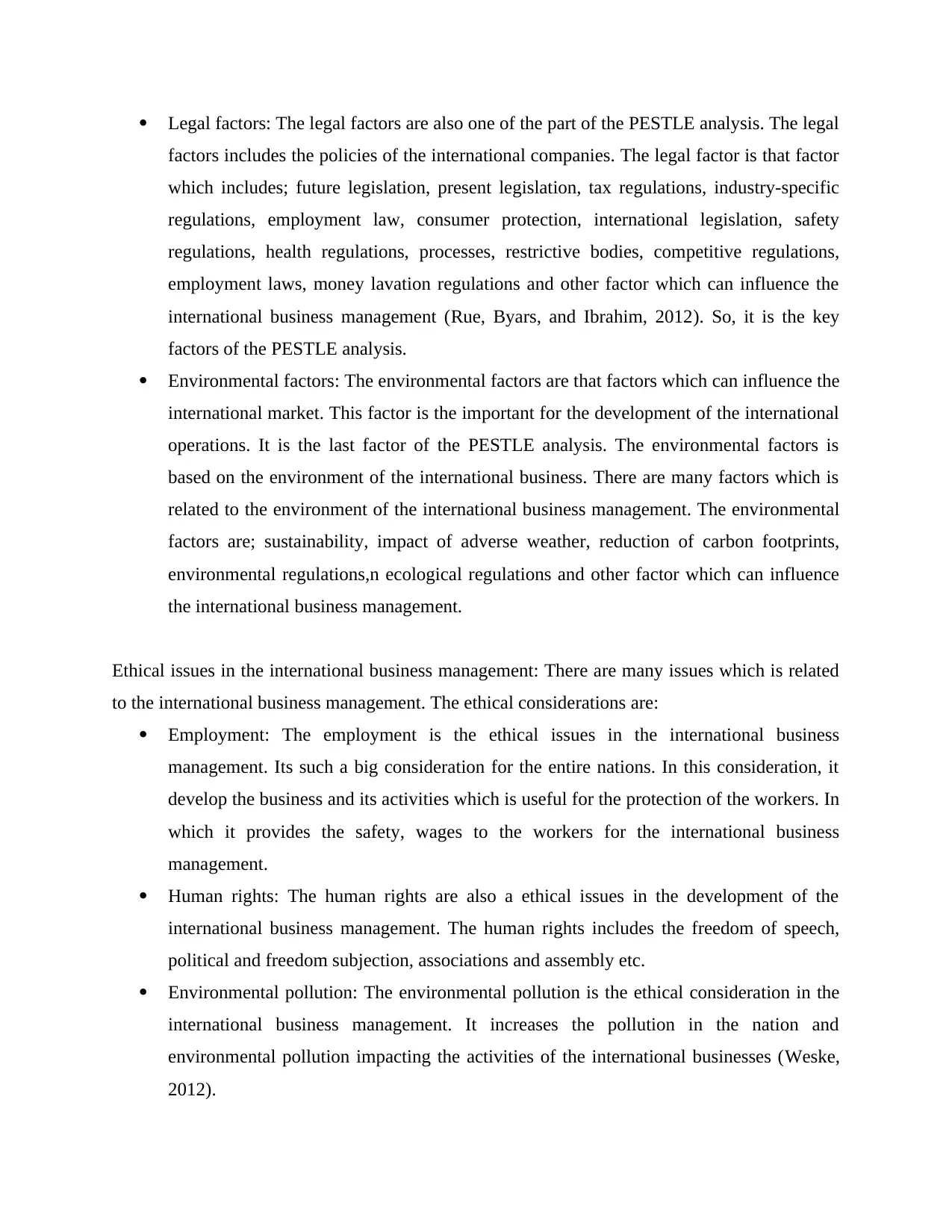
Legal factors: The legal factors are also one of the part of the PESTLE analysis. The legal
factors includes the policies of the international companies. The legal factor is that factor
which includes; future legislation, present legislation, tax regulations, industry-specific
regulations, employment law, consumer protection, international legislation, safety
regulations, health regulations, processes, restrictive bodies, competitive regulations,
employment laws, money lavation regulations and other factor which can influence the
international business management (Rue, Byars, and Ibrahim, 2012). So, it is the key
factors of the PESTLE analysis.
Environmental factors: The environmental factors are that factors which can influence the
international market. This factor is the important for the development of the international
operations. It is the last factor of the PESTLE analysis. The environmental factors is
based on the environment of the international business. There are many factors which is
related to the environment of the international business management. The environmental
factors are; sustainability, impact of adverse weather, reduction of carbon footprints,
environmental regulations,n ecological regulations and other factor which can influence
the international business management.
Ethical issues in the international business management: There are many issues which is related
to the international business management. The ethical considerations are:
Employment: The employment is the ethical issues in the international business
management. Its such a big consideration for the entire nations. In this consideration, it
develop the business and its activities which is useful for the protection of the workers. In
which it provides the safety, wages to the workers for the international business
management.
Human rights: The human rights are also a ethical issues in the development of the
international business management. The human rights includes the freedom of speech,
political and freedom subjection, associations and assembly etc.
Environmental pollution: The environmental pollution is the ethical consideration in the
international business management. It increases the pollution in the nation and
environmental pollution impacting the activities of the international businesses (Weske,
2012).
factors includes the policies of the international companies. The legal factor is that factor
which includes; future legislation, present legislation, tax regulations, industry-specific
regulations, employment law, consumer protection, international legislation, safety
regulations, health regulations, processes, restrictive bodies, competitive regulations,
employment laws, money lavation regulations and other factor which can influence the
international business management (Rue, Byars, and Ibrahim, 2012). So, it is the key
factors of the PESTLE analysis.
Environmental factors: The environmental factors are that factors which can influence the
international market. This factor is the important for the development of the international
operations. It is the last factor of the PESTLE analysis. The environmental factors is
based on the environment of the international business. There are many factors which is
related to the environment of the international business management. The environmental
factors are; sustainability, impact of adverse weather, reduction of carbon footprints,
environmental regulations,n ecological regulations and other factor which can influence
the international business management.
Ethical issues in the international business management: There are many issues which is related
to the international business management. The ethical considerations are:
Employment: The employment is the ethical issues in the international business
management. Its such a big consideration for the entire nations. In this consideration, it
develop the business and its activities which is useful for the protection of the workers. In
which it provides the safety, wages to the workers for the international business
management.
Human rights: The human rights are also a ethical issues in the development of the
international business management. The human rights includes the freedom of speech,
political and freedom subjection, associations and assembly etc.
Environmental pollution: The environmental pollution is the ethical consideration in the
international business management. It increases the pollution in the nation and
environmental pollution impacting the activities of the international businesses (Weske,
2012).
Paraphrase This Document
Need a fresh take? Get an instant paraphrase of this document with our AI Paraphraser
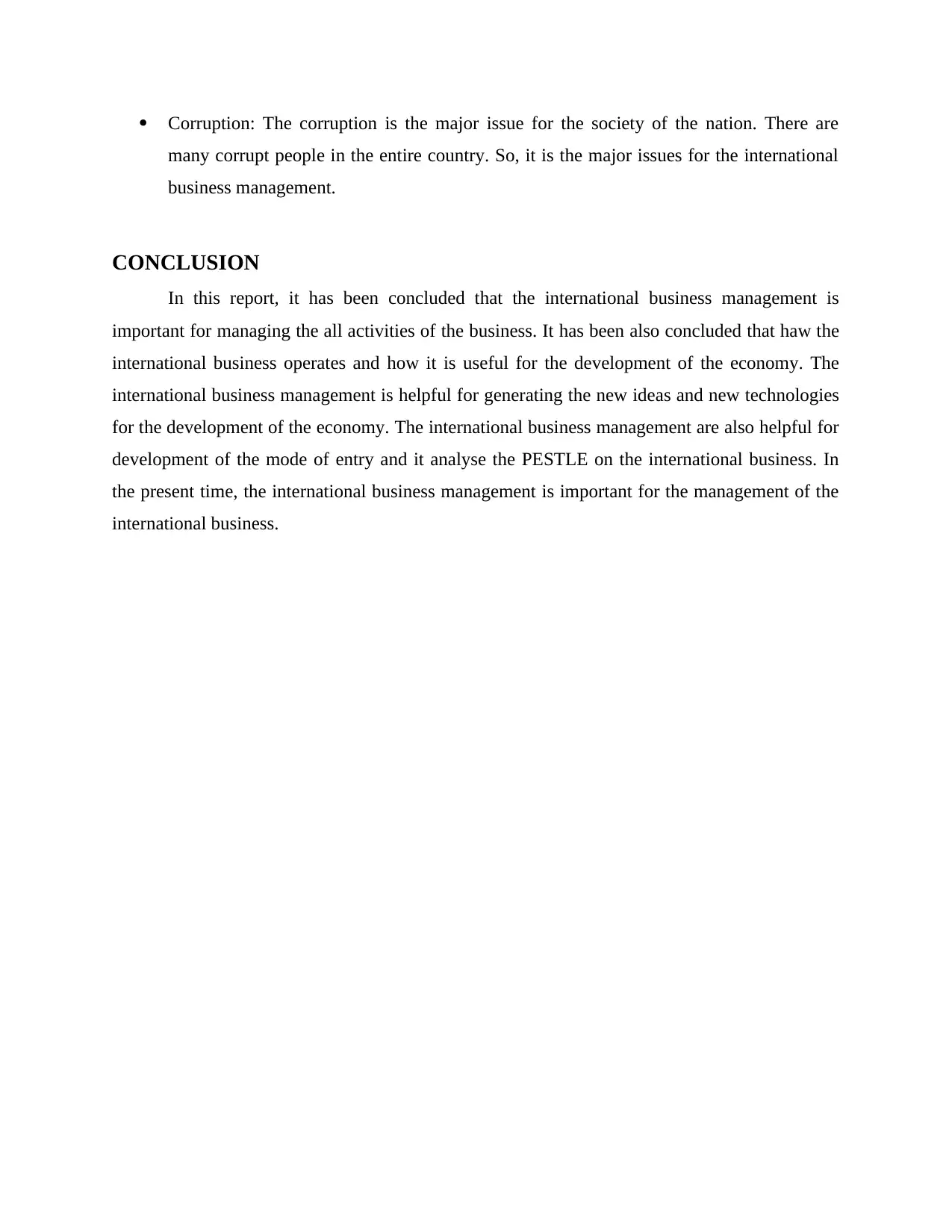
Corruption: The corruption is the major issue for the society of the nation. There are
many corrupt people in the entire country. So, it is the major issues for the international
business management.
CONCLUSION
In this report, it has been concluded that the international business management is
important for managing the all activities of the business. It has been also concluded that haw the
international business operates and how it is useful for the development of the economy. The
international business management is helpful for generating the new ideas and new technologies
for the development of the economy. The international business management are also helpful for
development of the mode of entry and it analyse the PESTLE on the international business. In
the present time, the international business management is important for the management of the
international business.
many corrupt people in the entire country. So, it is the major issues for the international
business management.
CONCLUSION
In this report, it has been concluded that the international business management is
important for managing the all activities of the business. It has been also concluded that haw the
international business operates and how it is useful for the development of the economy. The
international business management is helpful for generating the new ideas and new technologies
for the development of the economy. The international business management are also helpful for
development of the mode of entry and it analyse the PESTLE on the international business. In
the present time, the international business management is important for the management of the
international business.
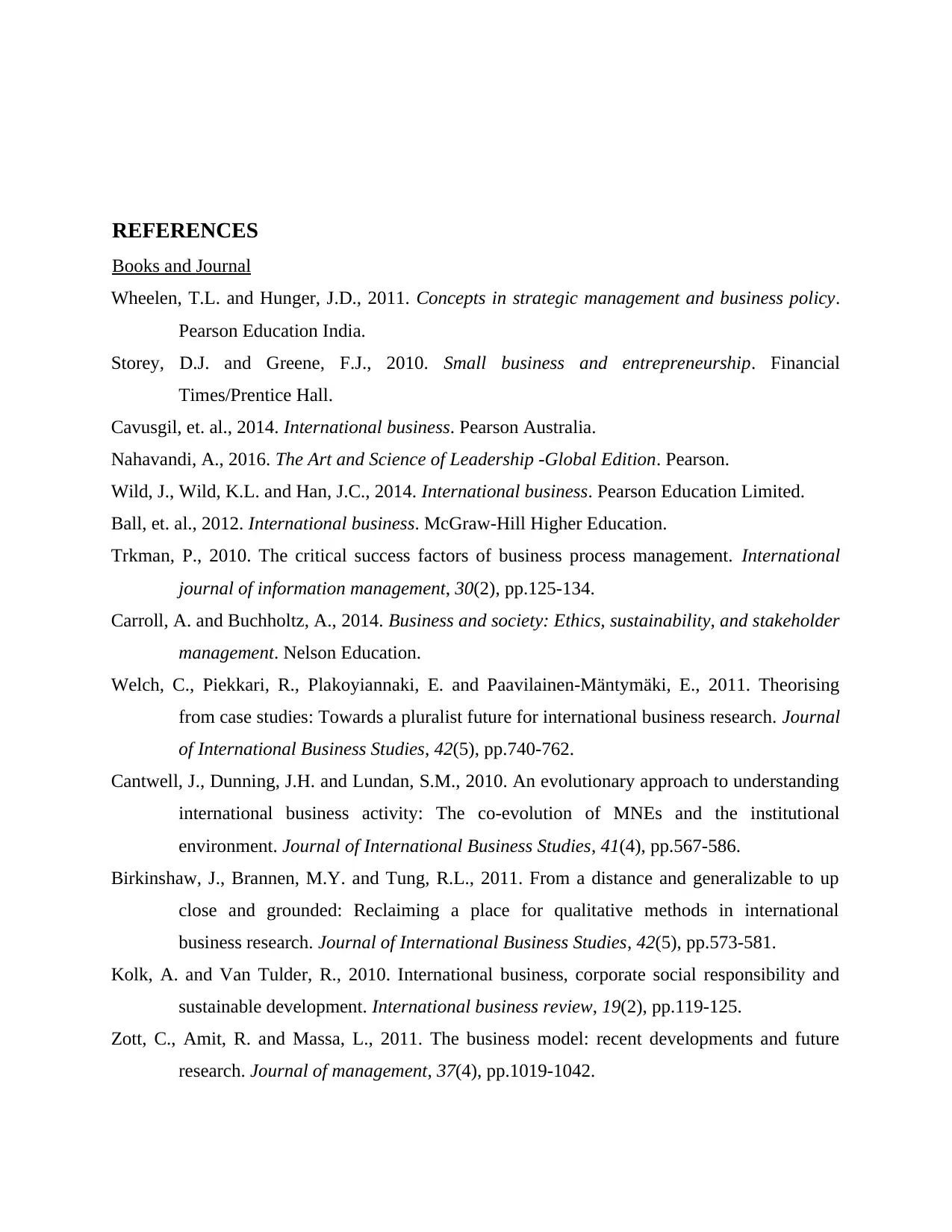
REFERENCES
Books and Journal
Wheelen, T.L. and Hunger, J.D., 2011. Concepts in strategic management and business policy.
Pearson Education India.
Storey, D.J. and Greene, F.J., 2010. Small business and entrepreneurship. Financial
Times/Prentice Hall.
Cavusgil, et. al., 2014. International business. Pearson Australia.
Nahavandi, A., 2016. The Art and Science of Leadership -Global Edition. Pearson.
Wild, J., Wild, K.L. and Han, J.C., 2014. International business. Pearson Education Limited.
Ball, et. al., 2012. International business. McGraw-Hill Higher Education.
Trkman, P., 2010. The critical success factors of business process management. International
journal of information management, 30(2), pp.125-134.
Carroll, A. and Buchholtz, A., 2014. Business and society: Ethics, sustainability, and stakeholder
management. Nelson Education.
Welch, C., Piekkari, R., Plakoyiannaki, E. and Paavilainen-Mäntymäki, E., 2011. Theorising
from case studies: Towards a pluralist future for international business research. Journal
of International Business Studies, 42(5), pp.740-762.
Cantwell, J., Dunning, J.H. and Lundan, S.M., 2010. An evolutionary approach to understanding
international business activity: The co-evolution of MNEs and the institutional
environment. Journal of International Business Studies, 41(4), pp.567-586.
Birkinshaw, J., Brannen, M.Y. and Tung, R.L., 2011. From a distance and generalizable to up
close and grounded: Reclaiming a place for qualitative methods in international
business research. Journal of International Business Studies, 42(5), pp.573-581.
Kolk, A. and Van Tulder, R., 2010. International business, corporate social responsibility and
sustainable development. International business review, 19(2), pp.119-125.
Zott, C., Amit, R. and Massa, L., 2011. The business model: recent developments and future
research. Journal of management, 37(4), pp.1019-1042.
Books and Journal
Wheelen, T.L. and Hunger, J.D., 2011. Concepts in strategic management and business policy.
Pearson Education India.
Storey, D.J. and Greene, F.J., 2010. Small business and entrepreneurship. Financial
Times/Prentice Hall.
Cavusgil, et. al., 2014. International business. Pearson Australia.
Nahavandi, A., 2016. The Art and Science of Leadership -Global Edition. Pearson.
Wild, J., Wild, K.L. and Han, J.C., 2014. International business. Pearson Education Limited.
Ball, et. al., 2012. International business. McGraw-Hill Higher Education.
Trkman, P., 2010. The critical success factors of business process management. International
journal of information management, 30(2), pp.125-134.
Carroll, A. and Buchholtz, A., 2014. Business and society: Ethics, sustainability, and stakeholder
management. Nelson Education.
Welch, C., Piekkari, R., Plakoyiannaki, E. and Paavilainen-Mäntymäki, E., 2011. Theorising
from case studies: Towards a pluralist future for international business research. Journal
of International Business Studies, 42(5), pp.740-762.
Cantwell, J., Dunning, J.H. and Lundan, S.M., 2010. An evolutionary approach to understanding
international business activity: The co-evolution of MNEs and the institutional
environment. Journal of International Business Studies, 41(4), pp.567-586.
Birkinshaw, J., Brannen, M.Y. and Tung, R.L., 2011. From a distance and generalizable to up
close and grounded: Reclaiming a place for qualitative methods in international
business research. Journal of International Business Studies, 42(5), pp.573-581.
Kolk, A. and Van Tulder, R., 2010. International business, corporate social responsibility and
sustainable development. International business review, 19(2), pp.119-125.
Zott, C., Amit, R. and Massa, L., 2011. The business model: recent developments and future
research. Journal of management, 37(4), pp.1019-1042.
⊘ This is a preview!⊘
Do you want full access?
Subscribe today to unlock all pages.

Trusted by 1+ million students worldwide
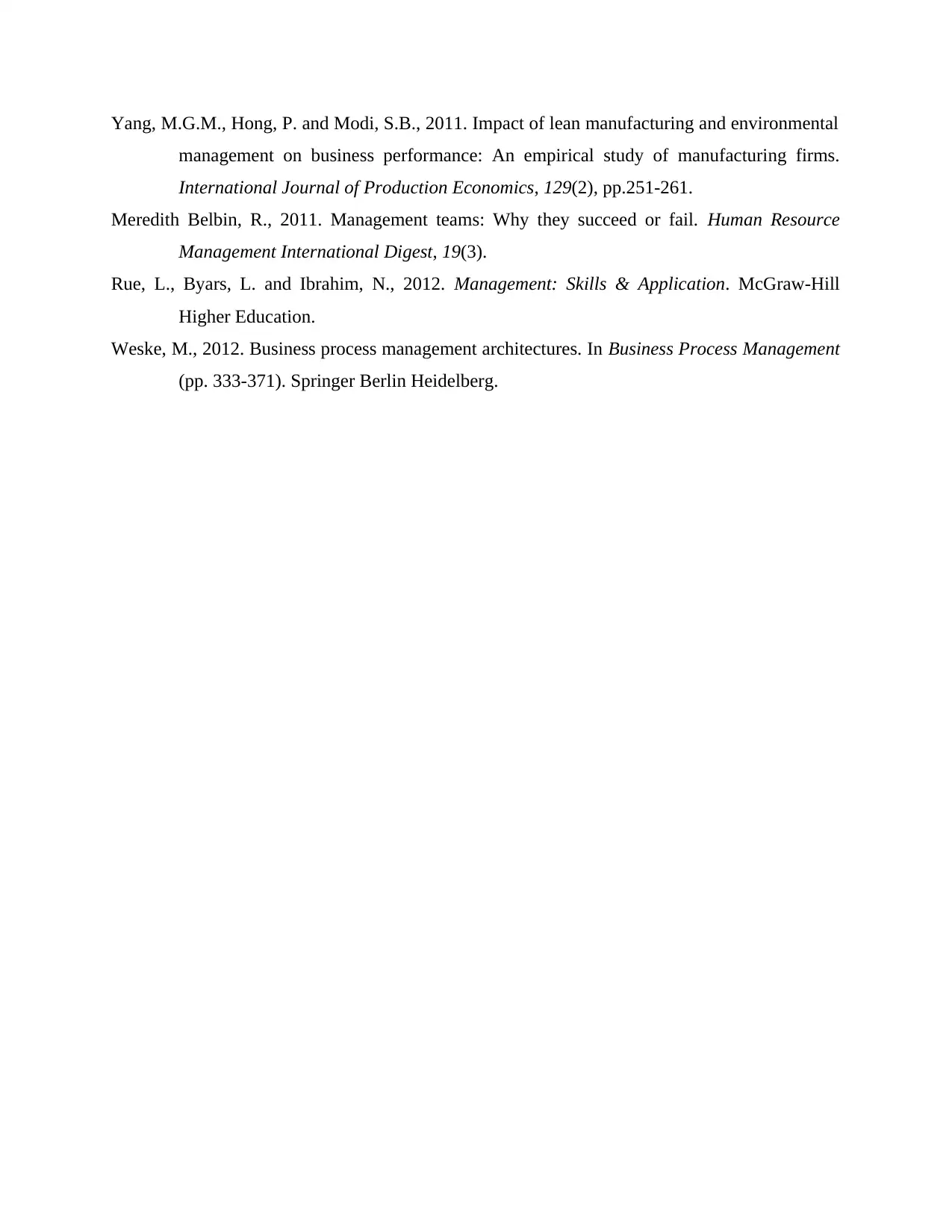
Yang, M.G.M., Hong, P. and Modi, S.B., 2011. Impact of lean manufacturing and environmental
management on business performance: An empirical study of manufacturing firms.
International Journal of Production Economics, 129(2), pp.251-261.
Meredith Belbin, R., 2011. Management teams: Why they succeed or fail. Human Resource
Management International Digest, 19(3).
Rue, L., Byars, L. and Ibrahim, N., 2012. Management: Skills & Application. McGraw-Hill
Higher Education.
Weske, M., 2012. Business process management architectures. In Business Process Management
(pp. 333-371). Springer Berlin Heidelberg.
management on business performance: An empirical study of manufacturing firms.
International Journal of Production Economics, 129(2), pp.251-261.
Meredith Belbin, R., 2011. Management teams: Why they succeed or fail. Human Resource
Management International Digest, 19(3).
Rue, L., Byars, L. and Ibrahim, N., 2012. Management: Skills & Application. McGraw-Hill
Higher Education.
Weske, M., 2012. Business process management architectures. In Business Process Management
(pp. 333-371). Springer Berlin Heidelberg.
1 out of 10
Related Documents
Your All-in-One AI-Powered Toolkit for Academic Success.
+13062052269
info@desklib.com
Available 24*7 on WhatsApp / Email
![[object Object]](/_next/static/media/star-bottom.7253800d.svg)
Unlock your academic potential
Copyright © 2020–2026 A2Z Services. All Rights Reserved. Developed and managed by ZUCOL.





